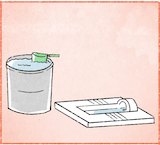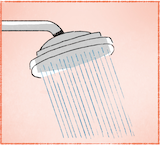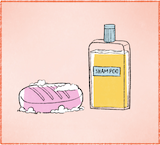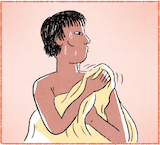



นี้คืออี่หยัง อันนี้เป็นโถส้วม อันนี้เป็นโถส้วม
โถส้วมนี้เอาไว้ถ้าเฮ็ดหญัง โถส้วมนี้กะมีปะโยดหลาย มีปะโยดคัก
ขั้นพุใดท้องเสีย หลืออยากเข้าห้องน้ำ หลือปวดเญี่ยว กะสามาดนั่งอยู่โถส้วมนี้ได้ หลือขี้หลือเญี่ยวอยู่ในโถส้วมนี้
อันวางตั้งอยู่ข้างๆ โถส้วมกะสิเป็นถังน้ำ มีน้ำอยู่ในหั้น แล้วกะมีขันพ้อม
ญามเฮาขี้แล้ว หลือเญี่ยวแล้ว เฮาอยาก[สิ]ทำความสะอาด หลือล้างโถส้วมนี้ เฮากะตักน้ำ เอาขันตักน้ำอยู่ในถังนั้น แล้วกะมาลาดลงอยู่ในโถส้วม
11
นี้คืออี่หยัง อันนี้เป็นฝักบัว เขาเอิ้นว่าฝักบัวอาบน้ำ
เขาเอาไว้ถ้าเฮ็ดอี่หยัง กะเอาไว้ถ้าอาบน้ำ หลือทำความสะอาดล้างกาย
12
นี้คืออี่หยัง อันนี้เป็นสะบู เป็นสะบูเหลว
เอาไว้ถ้าเฮ็ดหญัง เอาไว้ถ้าอาบน้ำ หลือไว้เอาทำความสะอาดล้างกาย
และสะบูนี้มันมีกิ่นหอมบ่ กะหอมอยู่ ขั้นมันมีกิ่นเหม็น คนกะสิบ่ใซ้ ขั้นมันมีกิ่นหอม คนกะสิมัก คนกะสิเอามาใซ้ เพื่อที่สิให้ล้างกายเฮาหอมๆ หลือเฮ็ดให้โตเฮาหอมนั้นหละ
13
เขากำลังเฮ็ดหญัง เขากำลังเซ็ดโต
เขาเซ็ดโตเฮ็ดหญัง เขาอาดสิอาบน้ำหัวกะแล้ว เขากะเลยสิเซ็ดโต
เพื่อว่า เขาอาบน้ำหัวกะแล้ว โตของเขากะสิเปียก มันสิมีน้ำติดอยู่โตของเขา เขาอาดสิอยากให้โตเขาแห้ง เขากะเลยสิเซ็ดโต เพื่อว่าโตเขาสิได้แห้ง เขากะเลยเอาผ้าเซ็ดโตนี้มาเซ็ดโตให้มันแห้ง
Link to overview page
Link to dictionary
| Isaan | Pronunciation | Tones | Thai | English/Notes |
|---|---|---|---|---|
| นี้ | ni: | HF | นี้ | 1. this 2. here |
| คือ | khʉ: | HR | คือ | 1. to be, to resemble, like, as 2. why {บักหล้าคือบ่เก็บโต่ะแน่ = [addressing a young boy] Why haven't you cleared the table?} |
| อี่หยัง | i:-yaŋ | H-M | อะไร | 1. what {นี้คืออี่หยัง = What is this?} {มื้อนี้เจ้าเฮ็ดอี่หยัง = What are you doing today?} {กินเข้างายกับอี่หยัง = What did you have for breakfast?} 2. something, anything, (in negations) nothing {บ่ต้องเฮ็ดอี่หยังอีกเลยนอกจากใส่ปุย = [we] don't need to do anything besides adding fertilizer} |
| อัน | an | M | อัน | 1. thing, object 2. general clf. for objects |
| เป็น | pen | M | เป็น | 1. to be, to exist 2. to be able to 3. to suffer, sth. happens to 4. เป็นหญัง[...]คือ in initial position: why? {เป็นหญังเขากะคือแปงฟัน = Why is he brushing his teeth?} {เป็นหญังเคี่ยงบินมันคือสิตก = Why is the airplane falling down?} |
| โถส้วม | tho:-su:am | M-LF | โถส้วม | lavatory, toilet |
| เอา | ao | M | เอา | to take, to give {เขากำลังเอาก่องไปซั่ง = he's taking the boxes to weigh them} {หมอกำลังเอายาให้คนป่วยกิน = the doctor is giving medicine to the patient} {เอาไว้ถ้า = is for, is used for, has the purpose of} |
| ไว้ถ้า | wai-tha: | HF-LF | usually in a positive statement or answer: is for, is used for, has the purpose of {กะทะมีไว้ถ้าทอด = a pan is for frying} {น้ำบักนาวมีไว้ถ้าปุงอาหาน = lime juice is used to season food} {ปากกามีไว้ถ้าเขียน = a pen is for writing} {กะเทียมเอาไว้ถ้าเฮ็ดแนวกิน = garlic is used to make food} {ขาเอาไว้ถ้าญ่าง = legs are for walking} {เกิบเอาไว้ถ้าใส่ = shoes are for wearing} Notes: see also ไว้ |
|
| เฮ็ด | het | H | ทำ | to do, to make |
| หญัง | ɲaŋ | M | อะไร, เป็นหญัง = ทำไม | 1. what {เขากำลังเฮ็ดหญัง = What is he doing?} {ธูปเอาไว้เฮ็ดหญัง = What are incense sticks for?} 2. something, anything, (nothing) 3. เป็นหญัง[...]คือ in initial position: why {เป็นหญังเขาคือใส่บักพิกลงไปในกวยเตียว = Why is he putting chili in [his] noodle soup?} {เป็นหญังหน้าต่างมันคือเปิด = Why is the window open?} {เป็นหญังมันคือมีควนไฟ = Why is there smoke?} |
| กะ | ga | M | ก็ | 1. then, consequently 2. also |
| มี | mi: | HR | มี | 1. to have 2. there is |
| ปะโยด | pa-yo:t | M-LF | ประโยชน์ | 1. benefit 2. useful |
| หลาย | la:i | M | เยอะ, มาก | many, much, very |
| คัก | khak | H | intensifier: very, very much | |
| ขั้น | khan | LF | เมื่อ | when, if |
| พุใด | phu-dai | H-M | ใคร | 1. who {มีพุใดโทมากะบ่ลู้ = I don't know who has called} {ห้องนอนของพุใด = whose bedroom (is this)? } 2. someone, somebody, anybody, in negative context: nobody {บ่มีพุใดอยู่กับเขาเลย = there's nobody with him} |
| ท้องเสีย | thɔ:ŋ-si:a | HF-M | ท้องเสีย | diarrhea |
| หลือ | lʉ: | M | หรือ | or |
| อยาก | ya:k | LF | อยาก | to want, to wish |
| เข้า | khao | LF | เข้า | to enter, to go inside, to come/go in/on {เข้าห้องน้ำ = to go to the bathroom} {เข้านอน = to go to bed} {ขี่เลียเข้าไปเกาะ = to take a boat to go on an island} |
| ห้องน้ำ | hɔŋ-na:m | LF-HF | ห้องน้ำ | bathroom |
| ปวด | pu:at | LF | ปวด | to ache, to be in pain, to have to [urinate/defecate] {ปวดเญี่ยว = I have to pee} |
| เญี่ยว | ɲi:ao | H | เยี่ยว | to urinate, to pee, to piss |
| สามาด | sa:-ma:t | M-HF | สามารถ | can, to be able |
| นั่ง | naŋ | H | นั่ง | to sit |
| อยู่ | yu: | H | อยู่ | 1. to be (located) at 2. yet, still 3. auxiliary indicating continuous or progressive action {ทอดปาอยู่ในกะทะ = (in the process of) frying a fish in the pan} {แม่กำลังเมี้ยนเฮียนอยู่ = mother is cleaning/tidying up the house} |
| ได้ | dai | HF | ได้ | 1. can 2. to get, to obtain 3. before verb: indicating past tense 4. บ่ได้ + verb: not |
| ขี้ | khi: | LF | ขี้ | 1. excrement, shit {ขี้หมา = dog shit} 2. to defecate, to shit Notes: prefix in front of nouns like ขี้ดิน, ขี้ตม, ขี้ผึ้ง, ขี้ฝ้า and verbs/adjectives like ขี้มึน |
| ใน | nai | HR | ใน | in, within |
| วาง | wa:ŋ | HR | วาง | to place, to set/put down {โทละสับ/phone: วางสาย = to hang up} {มีเกิบวางอยู่ในก่อง = there are shoes in the box} {มือข้างหนึ่งเขาวางอยู่เทิงโต่ะ = he's put one of his hands on the table} |
| ตั้ง | taŋ | HF | ตั้ง | to set/put up, to install, to establish, to erect {เขาตั้งนาลิกาปุกตอนสองโมงเซ้า = he sets the alarm clock to eight o'clock in the morning} {พัดลมตั้งโต่ะ = table fan} {ทะนาคานมันสิไปตั้งไว้อยู่ซู่หม้องเอาโลด = banks are [established/can be found] everywhere!} {ตั้งไฟ = to set up a fire} |
| ข้าง | kha:ŋ | LF | ข้าง | 1. side {มีหูจับสองข้าง = there are handles on both sides} 2. next to {วางอยู่ข้างๆ ก่องใบใหญ่ = it's placed next to the large box} {เขายืนอยู่ข้างๆ อีกพุหนึ่ง = he's standing next to another person} 3. clf. for body parts which come in pairs (eyes, ears, legs etc.) {เขามีตาสองข้าง = she has two eyes} |
| สิ | si | M | จะ | future tense auxiliary {เขากำลังสิตื่น = he's about to wake up} {สิไปตะหลาด = [I'm] going to the market} |
| ถัง | thaŋ | M | ถัง | 1. bucket 2. gas/petrol tank {ถังน้ำมัน = gas/petrol tank} |
| น้ำ | na:m | HF | น้ำ | 1. water 2. drink, soft drink, juice |
| หั้น | han | LF | ที่นั่น | there, over there |
| แล้ว | lɛ:o | HF | แล้ว | 1. finished 2. already 3. and then, and next (especially แล้วกะ) 4. auxiliary for past tense |
| ขัน | khan | M | ขัน | bowl |
| พ้อม | phɔ:m | HF | พร้อม | at the same time, also, too {มีตะเว็นพ้อม = the sun's out, too} {กะทะมีด้ามพ้อม = the pan has also a handle} |
| ญาม | ɲa:m | HR | ยาม | 1. period of time {ญามมื้อเซ้า = morning} {ญามเที่ยง = noon} 2. when, while {ญามทอด ต้องใซ้น้ำมันพ้อม = one needs to use oil when frying} {ญามสิออกไปข้างนอกกะต้องใส่เกิบ = when one goes out, ones has to wear shoes} |
| เฮา | hao | HR | เรา | 1. personal pronoun: we 2. personal pronoun: I |
| ทำความสะอาด | tham-khwa:m-sa-a:t | HR-HR-M-LF | ทำความสะอาด | to clean, to clean up, to do the cleaning |
| ล้าง | la:ŋ | HF | ล้าง | to wash |
| ตัก | tak | M | ตัก | 1. to scoop {ตักน้ำ = to scoop water} 2. to shovel/dig {เอาพั้วตักดิน = to dig with a spade} |
| นั้น | nan | HF | นั้น | that, there |
| มา | ma: | HR | มา | 1. to come 2. auxiliary expressing action towards the present or focal time {กะคุเฮ็ดมาจากอี่หยัง = What is the bucket made of?} {แล้วเขากะเก็บเงินจากพุนั้นมา = and then she takes the money of that person} |
| ลาด | la:t | HF | ราด | to pour |
| ลง | loŋ | HR | ลง | 1. to descend, to lower, to go down 2. down 3. bus/train etc.: to get off, to disembark {คนกำลังลงลดบั่ด = people are getting off the bus} 4. boat/ship etc.: to get on, to board {เขากำลังญ่างลงเลีย = he's boarding/getting on the boat} |
| ฝักบัว | fak-bu:a | M-M | ฝักบัว | shower {ฝักบัวอาบน้ำ = shower} |
| เขา | khao | M | เขา | personal pronoun: he, she |
| เอิ้น | ə:n | HF | พูด, เรียก | to call, to say {เอิ้นง่ายๆ ว่า = in other words} {คนอี่สานเอิ้นว่า เป็นลูกคนกก = Isaan people call her ลูกคนกก} |
| ว่า | wa: | H | ว่า | 1. that, as {คำว่า X = the word X} 2. to say |
| อาบน้ำ | a:p-na:m | LF-HF | อาบน้ำ | to take a bath/shower |
| ล้างกาย | la:ŋ-ga:i | HF-M | ร่างกาย | body |
| สะบู | sa-bu: | M-M | สบู่ | soap |
| เหลว | le:o | M | เหลว | liquid |
| ไว้ | wai | HF | ไว้ | 1. to keep, to put, to place, to retain, to save, to reserve {เขาเอาหัวของเขาไว้ใส = Where does she put her head?} {หมาสิเลี้ยงไว้บ้าน = dogs are kept/raised in the house} {ไก่เลี้ยงไว้ในคอก = chicken are kept/raised in a coop} {หน้ามันบังไว้ = the face is covered/not visible} {เขาเอาโทละสับวางไว้หู = he holds the phone to his ear} 2. for {นาลิกาปุกมีไว้เฮ็ดหญัง = What is an alarm clock for?} {หม้อเอาไว้เฮ็ดแนวกิน = a pot is used to make food} {ก่องเอาไว้เฮ็ดหญัง ก่องเอาไว้ใส่ของ = What is the box for? It's for putting in stuff.} Notes: see also ไว้ถ้า |
| และ | lɛ | H | และ | and |
| มัน | man | HR | มัน | it (also used to refer to people) |
| กิ่น | gin | H | กลิ่น | smell, scent, odour {ดมกิ่น, ได้กิ่น = to smell} |
| หอม | hɔ:m | M | หอม | to smell good, to be fragrant |
| บ่ | bɔ: | H | ไม่ | 1. no, not 2. question particle, transforming a statement into a question Notes: spelling exception in line with common usage on social media |
| เหม็น | men | M | เหม็น | to smell, to stink |
| คน | khon | HR | คน | person, people |
| ใซ้ | sai | HF | ใช้ | to use |
| มัก | mak | H | ชอบ | to like, to love, to want, to desire |
| เพื่อที่ | phʉ:a-thi: | H-H | เพื่อที่ | in order to, so that Notes: the vowel เอือ is likely to be a Thai loan |
| ให้ | hai | LF | ให้ | 1. to give {หมอกำลังเอายาให้คนป่วยกิน = the doctor is giving the patient medicine} 2. for 3. to allow, to be allowed |
| โต | to: | M | ตัว | 1. body, self 2. clf. for animals, characters/letters/consonants, appliances, clothes (e.g., pairs of trousers, shirts) |
| นั้นหละ | nan-la | HF-M | นั่นแหละ | auxiliary for emphasis at the end of a phrase |
| กำลัง | gam-laŋ | M-HR | กำลัง | auxiliary indicating continuous or progressive action |
| เซ็ด | set | H | เช็ด | to wipe, to rub, to clean {เซ็ดโต = to dry oneself [with a towel]} |
| อาด | a:t | LF | อาจ | 1. might, may, will 2. likely |
| หัว | hu:a | M | เพิ่ง | just, just now, only just {คนที่หัวกะเคยพ้อกัน = someone [we've] just met} {หัวกะตื่น = [I've] just woken up} {หัวกะซักมา = [the shirt has] just [been] washed} |
| เลย | lə:i | HR | เลย | 1. futher on, beyond, past {เข็มน้อยเลยเลขสิบสองไป = the minute hand has passed number twelve} 2. too much 3. at all 4. definitively 5. completely, utterly |
| เพื่อ | phʉ:a | H | เพื่อ | for Notes: the vowel เอือ is likely to be a Thai loan; pronunciation: also realized as เพี่ย |
| ของ | khɔ:ŋ | M | ของ | of, belonging to |
| เปียก | pi:ak | LF | เปียก | wet |
| ติด | tit | M | ติด | 1. to be attached to, to be on/at {สะวิดเปิดไฟติดอยู่ข้างฝาบ้าน = the light switch is on the wall} {มันสิมีน้ำติดอยู่โตของเขา = there is water on his body} 2. to stick (to), to attach (to) |
| แห้ง | hɛ:ŋ | LF | แห้ง | dry |
| ผ้าเซ็ดโต | pha:-set-to: | LF-H-M | ผ้าเช็ดตัว | towel, bath towel Notes: see also ผ้าขนหนู |